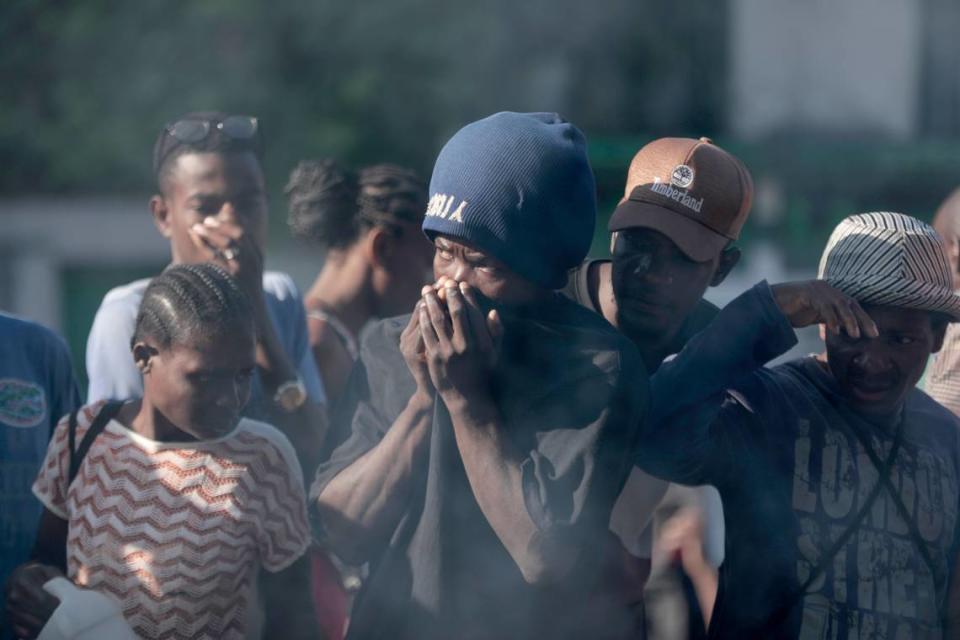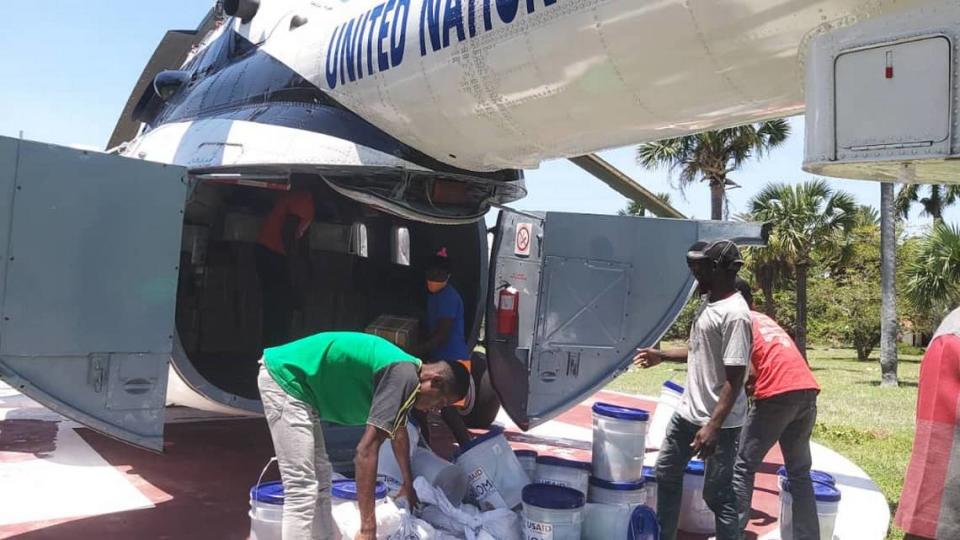Residents of Haiti capital seize gang members from cops, shoot and burn some alive
The minibus was headed through the Canapé-Vert neighborhood of Haiti’s capital early Monday morning when it came to a police checkpoint.
When officers saw that the minibus was packed with young men they suspected of being gang members, they stopped it and made everyone get off and lie on the ground. Soon, residents of the neighborhood appeared, dragged the men away from police custody and beat and stoned them. Then they threw gasoline-soaked tires on top of them — all under the eyes of the police — setting fire to more than a dozen people, some of them still alive.
“Pour gasoline, pour gasoline,” someone is heard saying on one of several videos showing the killing of the suspected gang members by the mob.
In another video, an unidentified man, counting 13 bodies, is heard screaming in Creole, “We just grabbed them out of a bus.”
In a statement, the Haiti National Police confirmed the incident, the latest as neighborhoods in Port-au-Prince increasingly come under attack by criminal gangs, police abandon posts and residents react with their own brand of justice.
Maten lendi a, popilasyon kanapevè a lapide epi mete dife sou 14 nèg aprè lapolis fin arete yo nan yon ti bis k ap sot Petyonvil. Nan ti bis sa a, fòs lòd yo jwenn plizyè nan nèg yo ak zam ak tout chajè sou yo. #PIP pic.twitter.com/gQ3BxRzCJ6
— Passion Info Plus (@passioninfoplus) April 24, 2023
“Things are degenerating,” said Gédéon Jean, a human rights lawyer and the founder of the Center for Analysis and Research in Human Rights in Port-au-Prince, which monitors kidnappings and violence by gangs that now control over 60% of Port-au-Prince. “Today, you have a population that is organizing to give itself justice. But you also have gangs that are seeking revenge and also attacking the population.”
Jean fears the latest lynching, as police have called it, will only lead “to a lot more carnage” as gangs seek revenge for the deaths of their compatriots.
Police said their intelligence unit was alerted to the presence of armed individuals in Canapé-Vert and began carrying out a search of vehicles in the area. When they searched the minibus, police found several armed individuals and confiscated weapons, ammunition and other materials.
“In addition, more than a dozen individuals traveling in this vehicle were unfortunately lynched by members of the population,” the statement said.
Haiti National Police spokesman Garry Desrosiers said police tried their best to bring the armed individuals to justice, but were overtaken by the mob who “lynched and burned them.” He did not provide details on how the crowd was able to get to the suspects or if police attempted to intervene.
He also did not say where the group was headed. Speaking at a Monday afternoon press conference, he confirmed that police were also called to another nearby neighborhood in Dubussy on Monday where an ensuing gun battle between specialized police units and an armed group led some residents to arm themselves with machetes and bottles, and others to flee their homes.
In a third incident Monday afternoon, six men were killed in an exchange of gunfire with police and residents set their bodies on fire. The incident occurred at the back of the Marriott Hotel, which is adjacent to the headquarters of telcom giant Digicel in the Turgeau neighborhood of Port-au-Prince.
“The Haiti National Police is mobilized and operations are ongoing,” Desrosiers said.
“We want to say to the population that we understand the situation that is facing you,” he said. “All of us in the society are victims. But the collaboration we are demanding has to be without violence.”
Haitians taking justice in their own hands
The violence Monday was not the first time that presumed bandits have been lynched and burned alive in Haiti. Increasingly faced with the inability of the police to protect their lives and property, and the reluctance of the international community to send help, Haitians are increasingly taking justice into their own hands. They are organizing themselves in neighborhoods by distributing weapons and forming security brigades.
But the actions are not without consequences. After residents in the neighborhood of Tunel in Pétionville on March 9 intercepted and burned several presumed gang members and turned others over to the police, they were targeted. On March 20, several members residents were killed in retaliation, their houses and vehicles burned, according to a report by the Center for Analysis and Research in Human Rights.

Jean believes that Monday’s lynching is directly tied to the death of a well-known gang leader, Carlo Petithomme, who was known as Ti Makak and led the gang by the same name. The gang started as a band of rag tag land thieves and emerged to be one of the more powerful armed groups, terrorizing residents in Laboule and Thomassin, affluent communities in the hills above Port-au-Prince.
Desrosiers, the police spokesman, confirmed that Petithomme was dead, but did not offer details about whether he died during a police operation or at the hands of another gang leader. He also gave a run-down of the security situation in the country, confirming two deadly gang clashes that occurred last week, one in the commune of Cité Soleil and the other in Source Matelas in the district of Cabaret, just north of Port-au-Prince.
The United Nations Office for the Coordination of Humanitarian Affairs said Monday that nearly 70 people had died between April 14 and April 19 in violent clashes between rival gangs in Cité Soleil, the capital’s largest slum. Since last year, residents living in the section of Brooklyn have regularly been victims of killings, rapes and other brutal attacks by gangs who also randomly shoot at them from nearby buildings.
About 40 others were injured by bullets or stabbed.
“Fighting is raging in Cité Soleil. The situation in Brooklyn, for example, is dramatic. The population feels under siege. They can no longer leave their homes for fear of gun violence and gang terror,” Ulrika Richardson, the U.N.’s humanitarian coordinator, said.
Many schools and health centers in the area are now closed, and the clashes have also restricted access to essential goods and services, the U.N. warned.
In his latest report to the U.N. Security Council, which will meet on Wednesday to discuss the situation in Haiti, Secretary General António Guterres said that Haiti’s political leadership continues to advocate for the immediate deployment of an international specialized force.
He also noted that a survey by a civil society group and private sector organization reveal that 79% of Haitians favor assistance in the former of international armed force to help the Haitian national police.
“The violence in Haiti continues to escalate, and State authorities have been unable to respond adequately. Gangs are targeting attacks on the police and police infrastructure. The police remain under-resourced and face overwhelming odds in their struggle to keep gangs from tightening their grip on the country,” Guterres said. “I am concerned that gangs are targeting children as well, notably through the recruitment of minors.”
In another incident last week, some resident in the town of Cabaret, were beheaded or shot to death. Armed bandits stormed the locality of Source Matelas in the middle of the day, burned houses and attacked the residents.
Days after the massacre, police were struggling to get an assessment of the death toll due to the ongoing presence of gangs, which had forced the population to lock themselves up at home. The incident has underscored the weakness of the Haitian police and its inability to stem the violence, with Desrosiers acknowledging that the force, already lacking in equipment, needs to have the “capacity to secure the area” so that gangs do not return.
“Once again, we are telling the population, the police are doing all that it can so that one day, people can circulate normally.”

Late Monday, the head of Haiti’s Office of Civil Protection, Jerry Chandler, issued an update on the situation in Source Matelas, which remained volatile with access into the community cut off.
At least 48 people were killed and 20 houses burned, Chandler said, noting that the violence spanned several days and worsened on Sunday. Several thousand people, including pregnant women with young children, have been forced to take refuge in neighboring towns to flee the gang violence.
“Considering the gravity and volatility of the situation, we expect a gradual increase in the number of people forced to move,” Chandler’s agency said in a press release, adding that the municipalities of Cabaret and nearby Arcahaie have both been hit by torrential rainfall.
Local civil protection officers, who made the assessment, have activated temporary shelters to accommodate many of the fleeing families. In addition on Monday, the Office of Civil Protection, which is the emergency responder for the government, and the International Organization for Migration, with logistical support from the U.N., airlifted blankets, hygiene kits, non-perishable goods and other items.
“We plan on doing more through the week because the needs are great and we plan on using air and sea for delivery as this area is not accessible by road from Port-au-Prince,” Chandler told the Miami Herald.

